
Integral Ecology: Uniting Multiple Perspectives on the Natural World
(Paperback)
Publishing Details
Integral Ecology: Uniting Multiple Perspectives on the Natural World
By (Author) Sean Esbjorn-Hargens
By (author) Michael E. Zimmerman
Foreword by Marc Bekoff
Shambhala Publications Inc
Integral Books
15th May 2010
14th February 2011
United States
Classifications
General
Non Fiction
304.201
Physical Properties
Paperback
832
Width 152mm, Height 229mm, Spine 43mm
1111g
Description
This comprehensive work presents a compelling theoretical framework for integrating insights about ecology from all over the map - from scientists, economists, ethicists, activists, philosophers - based on Ken Wilber's Integral Theory. But it's not just theory. The authors examine dozens of real-life applications of Integral Ecology currently in use, and they provide personal practices of transformation you can use to increase your own integral ecological awareness.
Reviews
Integral Ecology is a forward-looking book that invites compassionate proactive activism when dealing with the messes weve made. Time isnt on our side, but my optimism leads me to believe that if we embrace the authors messages and put them into action using humility, compassion, heart, and love, we still have a chance to pull ourselves out of the many deep holes were digging for ourselves, other animals, and ecosystems.Marc Bekoff, PhD, University of Colorado, author of Animals Matter and The Emotional Lives of Animals
This is the finest book on ecology bar none. Highest recommendation!Ken Wilber, author of Sex, Ecology, Spirituality and The Integral Vision
This book offers a promising approach for making sense of the diverse perspectives on the environment, including the many ways of understanding the complexities and challenges of global environmental change. The integral ecology framework provides a valuable roadmap for responding to contemporary problems such as climate change, biodiversity loss, and land use change. Given the widespread and often heated debates about environmental issues, the publication of Integral Ecology is timely and appreciated.Karen OBrien, PhD, University of Oslo, coauthor of Environmental Change and Globalization and member of the Nobel Peace Prizewinning team of the Intergovernmental Panel on Climate Change (IPCC)
In Integral Ecology Esbjrn-Hargens and Zimmerman have produced a complex framework (rooted in a hierarchy of integrative levels proposed by philosopher Ken Wilber) for the multidisciplinary interrogation of ecological problems. This framework provides an intelligent basis for discovering what questions need to be posed in our de facto postmodern era, and how to formulate them most effectively.Stanley N. Salthe, PhD, Brooklyn College, author of Evolving Hierarchical Systems and Development and Evolution
Integral Ecology is a remarkable work, indeed a tour de force. Like all path-breaking books it will provoke lively discussion and inevitable debate. It may even shift the course of our understanding of ecology. This is a book that invites us to read, enjoy, reflect, and act. And the time is now.Mary Evelyn Tucker, PhD, Yale University, co-editor of the ten-volume World Religions and Ecology Encyclopedia and author of Worldly Wonder
Deeper than deep ecology, integral ecology completes the century-long struggle to overcome the unfortunate legacy of Logical Positivism in the natural sciences and Behaviorism in the social sciences. Both blinkered and trammeled the human mind and spirit. At the the heart and soul of Integral Ecology is the frank recognition of interiority and subjectivity, as well as exteriority and objectivity, in the larger-than-human world. That's what Integral Ecology is all about. In addition to theoretical integral ecology, the authors, both gifted writers as well as thinkers, provide case studies applying integral ecology to real-world environmental conundrums.J. Baird Callicott, PhD, University of North Texas, co-editor of Encyclopedia of Environmental Ethics and Philosophy and The Wilderness Debate Rages On
Author Bio
Michael E. Zimmerman, PhD, is professor of philosophy and director of the Center for Humanities and the Arts at the University of Colorado, Boulder. He spent more than thirty years at Tulane University in New Orleans, where he was chair of the Department of Philosophy and co-director of Environmental Studies. He is co-editor of the popular textbook Environmental Philosophy and the author of Contesting Earth's Future. In addition, Michael has published nearly one hundred academic articles on philosophy and ecology. He lives in Boulder, Colorado, with his wife and daughter.
